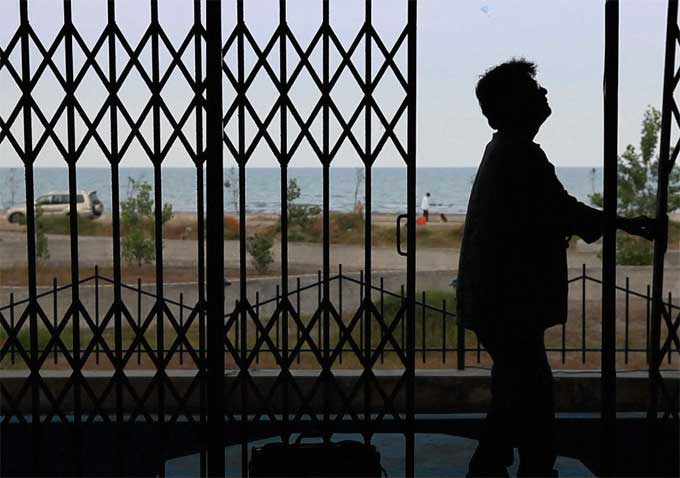By providing your information, you agree to our Terms of Use and our Privacy Policy. We use vendors that may also process your information to help provide our services. This site is protected by reCAPTCHA Enterprise and the Google Privacy Policy and Terms of Service apply.
Review: Why Jafar Panahi Was Right to Defy the Iranian Government Again With ‘Closed Curtain’
Eric Kohn

In 2011, shortly after he was banned by the Iranian government from making movies for 20 years, Jafar Panahi pulled off the impossible with “This Is Not a Film,” a bold, diary-like production shot in the confines of his apartment. Given the circumstances, “This Is Not a Film” looked like the only legitimate means that Panahi could still manage to produce work. Instead, his restless mind has yielded an even more ambitious achievement with the cryptically self-referential “Closed Curtain.” Tough to categorize but weighted with meaning, Panahi’s latest fascinating defiance of the constraints placed on him illustrates his deep commitment to the art form at all costs — including, perhaps, his own sanity.
At first, “Closed Curtain” takes the form of a more conventional narrative, following the experiences of an apparent man on the lam (filmmaker and Panahi screenwriter Kamboziya Partovi), who arrives at an isolated beach house (actually Panahi’s vacation home) and hides himself from the world. Two other refugees come and go before Panahi himself quietly becomes a part of the story while hovering outside of it, his characters commenting on his loose control over their existence. Even as they fade from view, however, the director can’t shake them.
A noticeably bigger production than “This Is Not a Film,” beautifully composed and patiently told within the confines of yet another restrictive set, “Closed Curtain” rigorously translates the literal despair of “This Is Not a Film” into pure symbolism. Though technically co-directed by Partovi — whose own passport was revoked after his involvement with this production, as was one of his co-star’s — Panahi’s central role in the movie (in addition to his editing credit) make it evident that this is his sorrowful tale alone.

But before it burrows into his problems, “Closed Curtain” provides a reminder that Panahi can still tell a compelling story. Starting with a wordless prologue and a lengthy opening shot, Panahi draws us into the travails of Partovi’s paranoid fugitive, who slinks into the vacant home and unleashes his adorable peppy dog from a duffle bag. A silent Greek chorus to the struggles surrounding him, the canine bears witness to his owner’s frantic behavior with a tranquility captured in astute closeups; meanwhile, Partovi ventures from one floor to the next, draping each window in black. The task is futile, of course: We can still see him. Panahi’s filmmaking continues.
As if reminding him that he can’t escape his situation, a storm settles in and more plot starts to take shape. A pair of siblings on the lam break into the home and beg Partovi to let them stay. But after one of them decides to head out, Partovi winds up stuck with a chatty, manic depressive young woman constantly probing him for his backstory. Attempting to write a screenplay and growing increasingly frustrated, Partovi initially comes across as a stand-in for Panahi until the truth of the matter bursts forth.
Once the curtains come down, Panahi abruptly steps into the scene, gazing wistfully at posters of his earlier movies that dot the walls. Clearly, he can’t keep his career away. Without overstating that revelation beyond the transparent metaphor of the title, the arbitrariness of the preceding hour takes on new meaning. Essentially a sequel in the saga of Panahi’s inhibited career, “Closed Curtain” finds him in a much darker state of mind than before, at one point contemplating suicide as “the only way out”; he even includes a fantasy sequence envisioning that possibility.
Just as the director broke down into tears in “This Is Not a Film” in the midst of attempting to explain a movie he could never make, his half-formed creations interrogate the futility of delaying his creative aspirations. After the house is broken into in the dead of night by unseen assailants — presumably a reference to what might happen to Panahi at any given moment — the project itself continues. “You can’t steal reality,” the woman says.

Diehard Panahi fans will rejoice at the filmmaker’s commitment to expressing his ideas despite the tremendous risk, but “Closed Curtain” requires immense patience and shows its seams at every step of the way. Less a finished movie than a cry for help, its enigmatic trajectory allows viewers to empathize with Panahi exclusively through his ideas. “There’s more to life than work,” a visiting colleague tells him. “Yes,” he mutters in reply, “but these things are foreign to me.”
Haunted by the nature of his talent while grasping to keep it alive, Panahi says little but implies much, particularly in a finale that’s defined by levels of ambiguity similar to those found elsewhere in the movie. At the same time, it implies a more upbeat outcome than the ominous conclusion to “This Is Not a Film.” In the struggle to tell a story, Panahi reveals the redemptive power of art. No longer issuing desperate pleas, he has turned to cinema for the sake of survival.
Grade: A-
A version of this review was published during the 2013 Berlin Film Festival. “Closed Curtain” opens at New York’s Film Forum tomorrow and will expand to other cities in the U.S. and Canada in the coming weeks.
By providing your information, you agree to our Terms of Use and our Privacy Policy. We use vendors that may also process your information to help provide our services. This site is protected by reCAPTCHA Enterprise and the Google Privacy Policy and Terms of Service apply.















